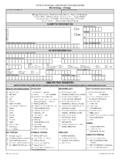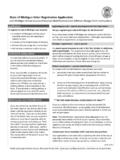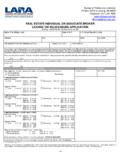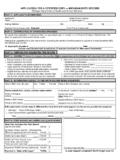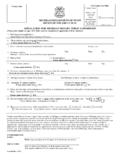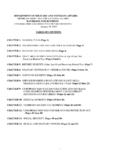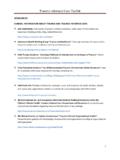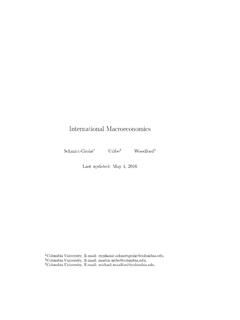Transcription of COMPULSORY SCHOOL ATTENDANCE ATTENDANCE ... - …
1 Michigan Department of Education COMPULSORY SCHOOL ATTENDANCE ATTENDANCE POLICIES AND GRADES The sections of the Revised SCHOOL Code that address this issue are contained in the Michigan Compiled Laws under MCL , , , , , and the State SCHOOL Aid Act under MCL Age of ATTENDANCE The law in Michigan governing COMPULSORY ATTENDANCE requires a parent, legal guardian, or other person having control or charge of a child age six to sixteen to send the child to SCHOOL during the entire SCHOOL year, except under the limited circumstances specified in subsection (3) of section A child who was age eleven on or after December 1, 2009 or who was age eleven before that date and entered grade 6 in 2009 or later shall attend SCHOOL from age six to eighteen.
2 The exceptions include, but are not limited to, sending the child to a state-approved, nonpublic SCHOOL or educating the child at home in an organized educational program. Although the COMPULSORY SCHOOL ATTENDANCE law does not apply to children under the age of six, a child who is at least five years of age by December 1 of the SCHOOL year and is a resident of a SCHOOL district which provides kindergarten work is entitled to enroll in the kindergarten [MCL ]. Enforcement and the ATTENDANCE Officer ATTENDANCE officers are employed by an intermediate SCHOOL district or local SCHOOL district.
3 The ATTENDANCE officer has the powers of a deputy sheriff within the SCHOOL district while performing official duties and pursues cases of nonattendance which are reported to him or her by the proper authority. The ATTENDANCE officer, upon receiving notice of that fact, must give written notice either in person or by registered mail requiring the child to appear at SCHOOL on the next regular SCHOOL day following receipt of notice and to continue in regular and consecutive ATTENDANCE in SCHOOL . If the parent or legal guardian fails to comply with the notice, the ATTENDANCE officer must make a complaint against that individual in the proper court for refusal or neglect to send the child to SCHOOL .
4 The court then issues a warrant and proceeds to hear and make a determination in the case. The law also states that a parent or legal guardian who fails to comply with the COMPULSORY SCHOOL ATTENDANCE section of the Revised SCHOOL Code is guilty of a misdemeanor [MCL ]. ATTENDANCE Exceptions A child is not required to attend a public SCHOOL in the following cases: A child who is attending regularly and is being taught in a state approved nonpublic SCHOOL , which teaches subjects comparable to those taught in the public schools to children of corresponding age and grade, as determined by the course of study for the public schools of the district within which the nonpublic SCHOOL is located.
5 A child who is being educated at the child s home by his or her parent or legal guardian in an organized educational program in the subject areas of reading, spelling, mathematics, science, history, civics, literature, writing, and English grammar. The child who has graduated from high SCHOOL or has fulfilled all requirements for high SCHOOL graduation [MCL ]. 1 Michigan Department of Education Local ATTENDANCE Policies Local boards of education have the authority to adopt ATTENDANCE policies addressing the number of days a student may lose due to illness or other causes.
6 Although the law does not mandate that SCHOOL district policies distinguish between excused and unexcused absences, the State Board of Education has taken the position that districts should make this distinction. ATTENDANCE and Grades In a matter related to SCHOOL ATTENDANCE and grades, the Michigan Attorney General issued an opinion cited as 1978 OAG 5414 that states that the COMPULSORY SCHOOL ATTENDANCE law recognizes an educational value in regular ATTENDANCE at SCHOOL . The opinion states that classroom ATTENDANCE instills a concept of self-discipline, exposes a student to group interactions with teachers and fellow students, and enables a student to hear and participate in class discussion and other related learning experiences.
7 Based on these considerations, the Attorney General concluded that a SCHOOL district may consider ATTENDANCE in determining a student s grade in a course. The Michigan Merit Curriculum requires students entering the eighth grade in 2006 to meet specific high SCHOOL graduation requirements [MCL and MCL ]. The district must grant credit if a student passes an exam or series of exams used for testing-out, which the district has determined measures a student s proficiency in meeting the Michigan Merit course/credit content expectations. The district may establish reasonable time lines for when a student may be provided the opportunity to test-out.
8 Additional information regarding the Michigan Merit Curriculum may be accessed at Pupil Hours of Instruction Beginning in the 2003-2004 SCHOOL year, the State SCHOOL Aid Act established a minimum of 1,098 hours of pupil instruction. To qualify for state aid without a penalty, a local SCHOOL district provides to each pupil the required minimum number of 1,098 hours of instruction in a SCHOOL year [MCL (3)]. The state superintendent may waive the minimum instructional hour requirement for a department-approved alternative education program [MCL (9)].
9 SCHOOL districts have the option of counting up to 38 hours of professional development time toward the 1,098 hours of pupil instruction requirement [MCL (10)]. A SCHOOL district with a collective bargaining agreement that was in effect as of August 15, 2006, that permitted the use of up to 51 hours of professional development as hours of instruction can continue to count up to 51 hours of instruction until the collective bargaining agreement expires. The professional development time must be focused on achieving or improving adequate yearly progress, or be used for accreditation purposes, achieving highly qualified teacher status under No Child Left Behind, or maintaining teacher certification.
10 The first 6 days (or equivalent hours), where schools are closed due to conditions not within control of the SCHOOL ( , snow, severe storms, fires, health conditions, utility power unavailability, or water or sewer failure), may be counted toward the days and hours of pupil instruction requirements as provided in Section 101 of the State SCHOOL Aid Act [MCL ]. Up to an additional 6 days (or equivalent hours) that occur after April 1 of each year, where schools are closed for unusual and extenuating 2 Michigan Department of Education circumstances resulting from conditions not within the control of SCHOOL authorities, may be counted toward the days and hours of pupil instruction requirements if the first 6 days (or equivalent hours)

